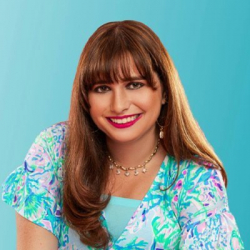Every year with the ADA Anniversary, I try to picture if the Americans with Disabilities Act were a person. I did it as a retrospective during the 30th anniversary, trying to picture one of my newly 30-year-old-friends getting promoted and buying a house. But this year, it feels sort of weird to do that, especially since The Squeaky Wheel, a disability culture site, wrote an amazing parody of that thinking – a rebellious 32-year-old who is afraid of retirement in light of the Roe decision.
Instead, I find myself reflecting on what I’ve learned about my own community and myself over the past year. I have been incredibly privileged to have my rights protected under the ADA since birth, and the generations of disabled activists who did not – and who fought for themselves, for me, and countless others – continue to have my respect and inspire me towards further inclusion and knowing what’s possible. I always feel uncomfortable saying other disabled people inspire me, primarily because of how awkward the idea of “inspiration porn” makes me feel. But that inspiration comes from a genuine place, not a “thank goodness that isn’t me,” but a “wow, my community continually motivates me and is truly a force to be reckoned with.”
That drive, that development of identity – is what the spirit of the ADA and revolution is all about. It is very easy to fall into the trap of wishing you were neurotypical and nondisabled. It was something I used to want at one point in my life. I used to wonder what it would be like to not have sensory differences, be socially adept in every situation, and what it would be like to have strong executive functioning skills. I no longer do. Instead, I adapt, I’ve made peace with the hand I’ve been dealt in life, and I am proud to be part of a community of fighters and advocates. My only regret is that I wish I had known how storied our history was sooner; so many of us deserve a comprehensive introduction to disability history (which is what made the Crip Camp documentary a few years ago so groundbreaking). I shouldn’t have had to learn all about people like me in college through disabilities studies courses. I should’ve had more than just Temple Grandin to point to as someone who had my same disability; today, I can point you to so many autistic and disabled people who are changemakers, leaders, or thriving in their own right, not despite, but because of disability.
As we trek on to wrap up Disability Pride Month, a lesson that I have been learning is not like our last one on accountability but in recognizing our own ignorance. Most of us think about accessibility in the physical sense; I think about it as a cognitive barrier. A friend with a physical disability recently remarked to me how surprising that was since I didn’t appear to know as much as expected about physical inaccessibility (“that isn’t my lived experience,” I explained). It reminds me of the absolute breadth of life experiences of disabled people and how we’re so often reduced to a very large monolith. I have no idea what it is like to have a neurodivergent or disabled experience that is not my own, but I continue to learn and listen and allow people with those experiences to lead the way.
It’s hard to sum up the ADA or even a disabled experience in one neat package with a tidy bow on top when it’s more like a box of chocolates, with rich flavors, diverse perspectives, and some surprises, too, when you never quite know what you’re going to get (whether it is who you will meet, how you will be treated, or how understanding and supportive someone is). But for now, I take comfort in how my community continues to grow, adapt, and revolutionize – and that our allies hopefully will join in on that, as well.
About the Guest Author

Haley Moss, Esq.
Haley Moss made international headlines for becoming the first documented openly autistic attorney admitted to The Florida Bar. She received her Juris Doctor from the University of Miami School of Law in 2018 and graduated from the University of Florida in 2015 with her B.S. in Psychology and B.A. in Criminology. Haley is a speaker, educator, scholar, and consultant on neurodiversity at work, the Americans with Disabilities Act, autism, and disability-adjacent topics.

